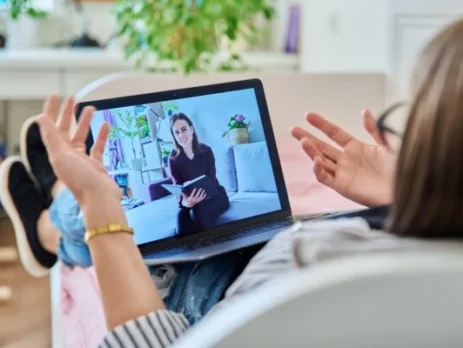People with anxiety, depression, or who have experienced past trauma often ask if online therapy is as effective as in-person therapy. This is mainly because mental health services have changed a lot recently, especially after the pandemic. As a result, online or virtual therapy has become more popular, and its benefits are clear: you can now seek help for yourself and your loved ones from the comfort of your home.
At Anxiety Trauma Depression Treatment Centers, we provide both in-person and Virtual Intensive Outpatient Programs (IOP) to suit each individual’s needs. Intensive Outpatient Programs (IOP) are structured treatment programs designed for individuals dealing with mental health issues who do not require round-the-clock care. IOP provides a higher level of support than traditional outpatient therapy while allowing individuals to maintain some normalcy in their daily lives, such as going to work or attending school.
When you or a loved one requires flexible scheduling and quality care, our virtual program is an ideal option that fits into school, work, and healing routines. Let’s look at the latest research on virtual care and why it might be the best choice for you or a loved one.
What the Research Says About Virtual Therapy and Virtual IOP
A growing body of evidence supports the effectiveness of virtual therapy for treating mental health conditions like anxiety, depression, and trauma. While much of the early research focused on weekly individual sessions, we now have strong data specifically evaluating Virtual Intensive Outpatient Programs (VIOP) structured programs offering multiple sessions per week.
Virtual IOP is as Effective as In-Person IOP
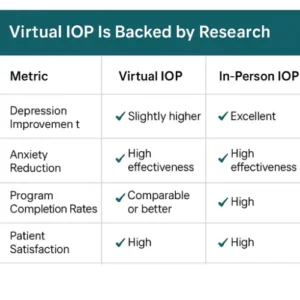 These Peer-reviewed studies now show that virtual IOP provides comparable and in some cases superior outcomes to traditional in-person IOP:
These Peer-reviewed studies now show that virtual IOP provides comparable and in some cases superior outcomes to traditional in-person IOP:
- DBT-Based Virtual IOP for Dual Diagnosis Patients (Bean et al., 2022): A 2022 study in the Journal of Clinical Psychology compared outcomes for patients attending a Dialectical Behavior Therapy (DBT)–based IOP, either in person or virtually. Both groups showed large reductions in depression, anxiety, and stress. Virtual participants had slightly larger effect sizes in symptom reduction. Depression effect size: 1.05 (virtual) vs 0.80 (in-person).
- Group-Based Virtual IOP for Anxiety & Depression (Puspitasari et al., 2021): A 3-week virtual group therapy IOP was evaluated for individuals needing more intensive treatment than weekly sessions. Patients reported strong symptom reduction and high program satisfaction. The program was feasible, well-attended, and effective in the short term.
Clinical research now shows that Virtual IOP can deliver results equal to or better than in-person care in several areas. This makes Virtual IOP an ideal option for those needing intensive support without the logistical hurdles of travel or in-office schedules.
Here are the Benefits of Virtual Therapy
 Accessibility and Convenience: Online or Virtual therapy is easier because it removes travel time, costs, and scheduling issues. It’s great for busy students, professionals, and parents.
Accessibility and Convenience: Online or Virtual therapy is easier because it removes travel time, costs, and scheduling issues. It’s great for busy students, professionals, and parents.- Continuity of Care: Virtual sessions enable patients to maintain consistent care, even when changes in their circumstances, such as relocating or experiencing illness, might otherwise disrupt their treatment.
- Comfort and Privacy: Many individuals prefer virtual therapy because they feel more comfortable sharing in the privacy of their own homes, leading to more honest sessions and better results.
- Flexible Treatment Options: Virtual Intensive Outpatient Programs (IOP) allow participants to choose from different ways to engage in treatment. Options include one-on-one therapy, group sessions, and educational workshops. This flexibility helps keep participants involved and creates a more personal recovery experience that meets their individual needs and preferences.
Comparing Outcomes: Virtual vs. In-Person Care
The charts below summarize recent findings comparing the outcomes of online therapy and face-to-face therapy:
- Chart: Clinical Response / Remission Rates
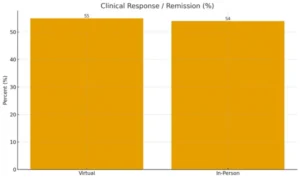
- Chart: Dropout Rates (Virtual vs. In-Person)
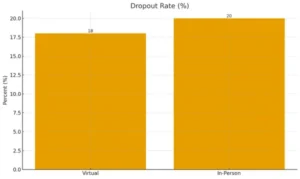
- Chart: Patient Satisfaction Ratings
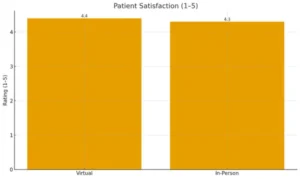
The data in these charts indicate that the rates of symptom reduction, remission, and patient satisfaction are nearly identical for both formats. While dropout rates are slightly lower for in-person care, virtual therapy offers a modest advantage in terms of accessibility and comfort.
How Our Virtual IOP Works
 Our Virtual Intensive Outpatient Program (IOP) is designed for adolescents, young adults, and adults who require more support than weekly therapy can provide but do not need inpatient care. The program includes:
Our Virtual Intensive Outpatient Program (IOP) is designed for adolescents, young adults, and adults who require more support than weekly therapy can provide but do not need inpatient care. The program includes:
- Up to 13 hours of evidence-based therapy per week, organized into three-hour blocks.
- Various types of therapy are available, including Cognitive Behavioral Therapy (CBT), Dialectical Behavior Therapy (DBT), Acceptance and Commitment Therapy (ACT), psychodynamic therapy, and activities such as art and music therapy.
- Weekly individual, group, and family therapy sessions.
- Flexible scheduling to accommodate school, work, or family commitments.
Selecting the Right Treatment for You or a Loved One
When determining whether online therapy or in-person therapy is more suitable for you, especially when your current therapy isn’t working, consider the following factors:
- What do you want to get from therapy
- The severity of your symptoms
- Your comfort with technology
- Any challenges, such as transportation or scheduling issues
At Anxiety Trauma Depression Treatment Centers, we are here to help you make the right decision and develop a personalized plan that prioritizes your healing.
Take the Next Step 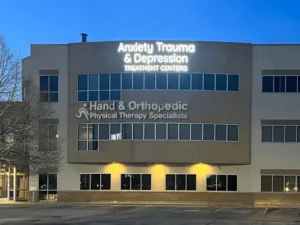 for Recovery
for Recovery
If you or a loved one is experiencing anxiety, depression, trauma, or similar issues, you don’t have to face it alone. Our expert team is ready to provide effective care, whether in person or online.
👉 Contact us today to speak with our admissions coordinators and determine if a Virtual Intensive Outpatient Program (IOP) or in-person care is the right fit for you.


